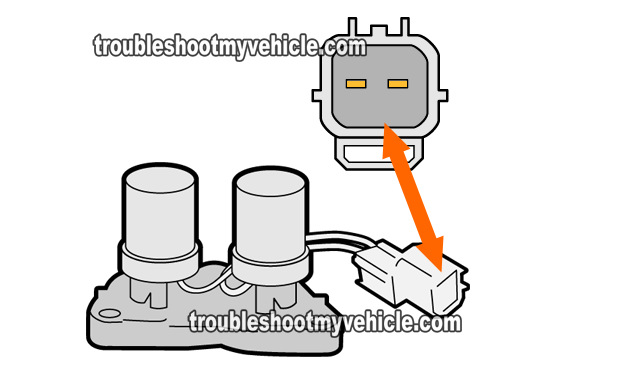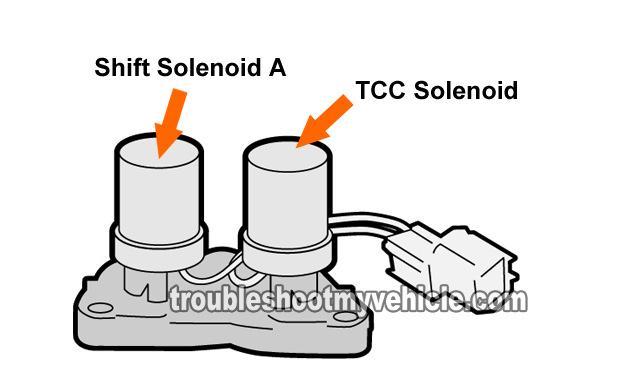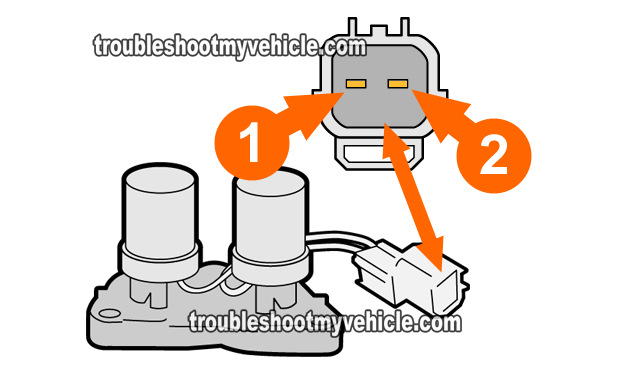
Testing the Torque Converter Clutch (TCC) Solenoid/Shift Solenoid A assembly isn't hard and in this tutorial I'm gonna' show you how in a step-by-step manner.
Now, in case you're wondering, the Torque Converter Clutch (TCC) Solenoid/Shift Solenoid A assembly is also known as the lock-up control solenoid assembly in Honda tech speak.
When this bad boy fails, diagnostic trouble codes P0753 and/or P1753 will be registered and the D4 indicator light will flash and/or the check engine light will illuminate.
Contents of this tutorial:
- Symptoms Of A Bad Lock Up Solenoid Assembly.
- Basics Of The Lock Up Solenoid Assembly.
- START HERE: The Lock Up Solenoid Assembly Tests.
- TEST 1: Shift Solenoid A Resistance Test.
- TEST 2: Applying 12 V To Shift Solenoid A.
- TEST 3: TCC Solenoid Resistance Test.
- TEST 4: Applying 12 V to TCC Solenoid.
- Solenoid Assembly Is Good But Transmission Still Not Shifting.
- More Honda Accord Test Tutorials.
The following Honda automatic transmission tutorials may be of help too:
- How To Test: Shift Solenoid B and C (Honda 2.2L, 2.3L).
- How To Test: A/T Clutch Pressure Control Solenoid A and B (Honda 2.2L, 2.3L).
- How To Test: Transmission Range Switch (Honda 2.2L, 2.3L).
ES ![]() You can find this tutorial in Spanish here: Cómo Probar: Solenoide TCC y Solenoide de Cambio A (Honda 2.2L, 2.3L) (at: autotecnico-online.com).
You can find this tutorial in Spanish here: Cómo Probar: Solenoide TCC y Solenoide de Cambio A (Honda 2.2L, 2.3L) (at: autotecnico-online.com).
Symptoms Of A Bad Lock Up Solenoid Assembly
The symptoms of a bad lock-up shift solenoid assembly depend on which of the two solenoids has failed.
Here's a breakdown of the symptoms produced by each (when they fail):
Symptoms of a bad lock-up control solenoid:
- P1753: Problem in Torque Converter Clutch Solenoid Valve Circuit trouble code registered in the PCM's memory.
- D4 indicator light flashing.
- Torque converter lock-up doesn't operate smoothly.
- Torque converter lock-up doesn't engage.
- Torque converter lock-up doesn't disengage.
Symptoms of a bad shift solenoid A:
- P0753: Shift Solenoid A Electrical trouble code registered in the PCM's memory.
- D4 indicator light flashing.
- Erratic shifting.
- Doesn't shift into 4th gear (NOT TO BE confused with slipping in 4th gear).
- Your Honda does not move with shift lever in manual 2 position, but does in D4, D3, R and manual position 1.
Basics Of The Lock Up Solenoid Assembly


The solenoid assembly is made up of two solenoids. One is the torque converter clutch solenoid and the other is the shift solenoid A.
The solenoid assembly is located on the exterior of the transmission housing and bolted down by 3 bolts. Photo 1 of 2 and 2 of 2, in the image viewer, show the location of the assembly on the transmission itself.
Here's some basic, and I stress 'basic', info on both solenoids (that make up the assembly):
Torque converter clutch solenoid valve:
- PCM activates the solenoid as your Honda reaches a prescribed speed.
- Solenoid is activated only in 3rd and 4th gears only.
- When ‘On’, causes the lock up clutch to engage inside the torque converter.
- The torque converter clutch solenoid is also known as:
- Lock-up control solenoid.
- TCC solenoid.
- The lock-up control solenoid is identified in image 2 of 2 (in the image viewer).
Shift solenoid valve A:
- Works in conjunction with shift solenoid B and shift solenoid C.
- Is activated by the PCM.
- In D3 or D4, the solenoid is:
- 1st gear: ON.
- 2nd gear: ON.
- 3rd gear: ON.
- Shift solenoid A is identified in image 2 of 2.
OK, let's get testing.
START HERE: Lock Up Solenoid Assembly Tests
Troubleshooting the lock-up solenoid assembly isn't hard. There are two basic tests for each solenoid that makes up the pack.
Here's a brief description of the 4 tests in this tutorial:
- Resistance testing shift solenoid A..
- This test simply involves measuring the resistance of shift solenoid A and comparing the value with the factory spec of 12-25 Ohms.
- TEST 1: Shift Solenoid A Resistance Test.
- Manually applying 12 Volts to shift solenoid A.
- In this test, you'll use a jumper wire to apply power (from your Honda's battery) to shift solenoid A and listen for a clicking sound.
- TEST 2: Applying 12 V To Shift Solenoid A.
- Resistance testing the TCC lock-up solenoid..
- This test simply involves measuring the resistance of the TCC lock-up solenoid and comparing the value with the factory spec of 12-25 Ohms.
- TEST 1: TCC Lock-up Solenoid Resistance Test.
- Manually applying 12 Volts to the TCC lock-up solenoid..
- In this test, you'll use a jumper wire to apply power (from your Honda's battery) to the TCC lock-up solenoid and listen for a clicking sound.
- TEST 2: Applying 12 V To The TCC Lock-Up Solenoid.



